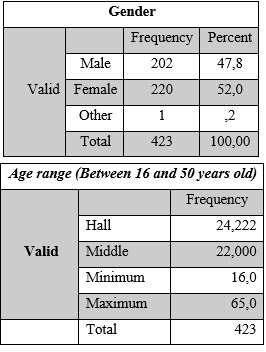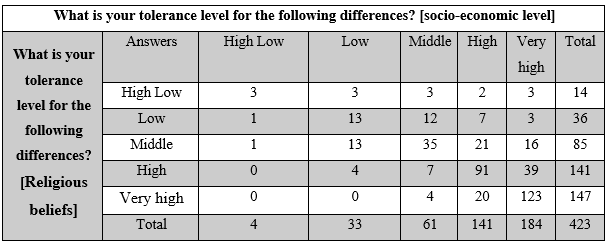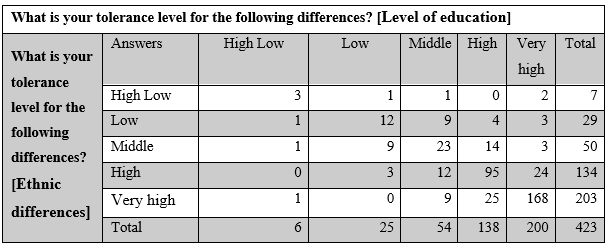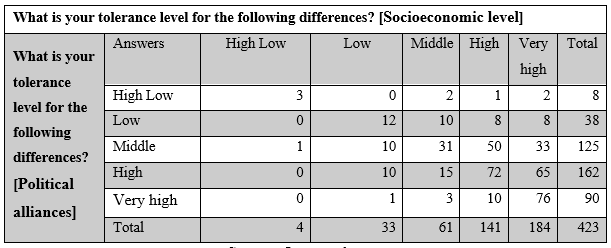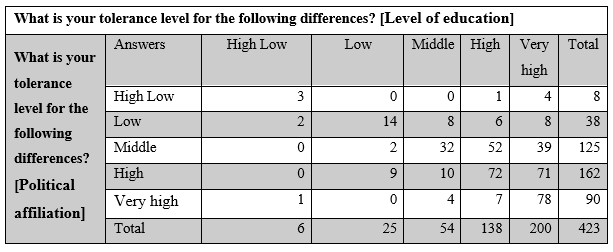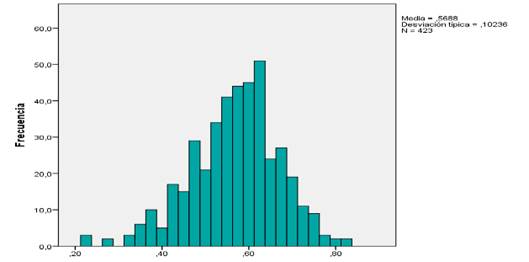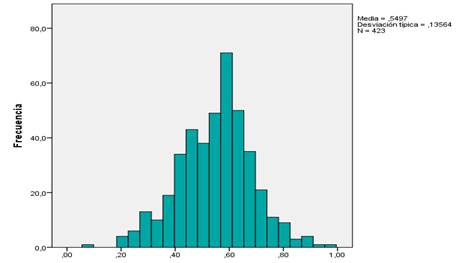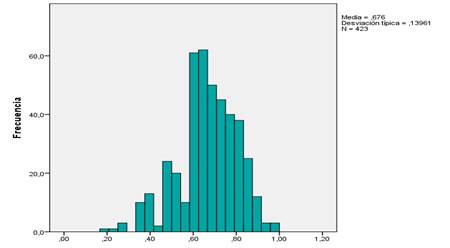INTRODUCTION
Negotiations between the government unmarginalized groups have formed a new post-conflict reality in present-day Colombia. This new reality demands clarity and understanding so it can fully materialize and take roots within society. This change must come from a compromise between all social strata. Common objectives unite the public and civil society, who together have the potential to stabilize relations across the territory on a political and social level, after a long period of internal conflict.
In this context, higher education is very important, especially as the behavior of a given community begins in an educational setting. This formation starts with the development of strategies to help citizens unearth certain capabilities within themselves to help firm up their role as responsible agents of change. Encouraging teamwork and collaboration with different people leads students to form networks that promote working towards the common good. To this end, higher education institutions are opting for curriculums that do not solely focus on disciplinary knowledge, but rather those that bring together a range of skills and abilities. The purpose of this is to empower students to become aware of their civil rights and responsibilities and to strengthen their role as agents of change. This is how universities contribute to the country’s social transformation.
The civil empowerment study in Colombia amounted to work carried out by the National Ministry of Education, particularly in primary education from 2004 onwards. The study called ´basic standards for civil empowerment´ defines the work as ´the coming together of cognitive, emotional, and communicative knowledge and skills, which make it possible for a citizen to behave constructively within a democratic society (Mieles & Alvarado, 2012, p.64).
To analyze and reflect on civil empowerment it is necessary to discuss objective and subjective knowledge in different contexts. These must consider external factors, as well as the impact of different structures and institutions. Citizens must interact with the normal situations which form part of their personal and social spheres, taking note of how these are affected by their education and culture. These effects are expressed through social behaviors and validated by others, known as habitus in the words of Bourdieu (2000). The impact is seen in individual experiences and through how a person interacts with their surroundings. These characteristics go beyond merely their levels of civic participation.
Becoming involved in the study and evaluation of citizen empowerment as an important issue is, without doubt, a way of strengthening democracy. It is also a way of promoting peaceful solutions, increasing tolerance, and strengthening respect for established social order. This in turn benefits the common good and offers people the chance of civil life, albeit in a society that requires substantial social change.
To tackle this problem, we present this descriptive research project which mainly focuses on quantitative analysis, looking at the development and application of civil empowerment within higher education. Analysis was carried out within the academic community of ECCI University in the form of a case study. This study can be used as a reference for trends in teaching civil empowerment in higher education in Colombia.
THEORETICAL REFERENCES
To understand the scope of the connection between civil empowerment and higher education, it is first necessary to closely study this idea and its application within education in the Colombian context. This field was first explored at the end of the 20th century, and it became the primary field of study within middle and primary education. In theory, this has generated changes that have had an impact on society and encouraged the aligning of education with the needs of the country and society.
This paradigm, a new focus on quality education in the country, has strengthened the development of social change to a certain extent, however it has still not had the desired impact. Since the end of the 90s, the economic, political, and social dynamics of the country have been impacted by an internal conflict of grand proportions, and this has caused many problems. These problems can be seen in the high levels of inequality and violence within certain parts of society, which then trigger more issues on a local level. Global geopolitical changes create complex situations that affect the territory, for example, increased migration from Venezuela to Colombia and the internal displacement of many due to the armed conflict.
To understand this phenomenon, it is necessary to see citizenship as a social status where one’s duties and rights combine with political order. Citizenship allows common agreements to form and develop through democracy and civil participation Kaldor (2005).
Therefore, exercising the role of citizenship means facing challenges that arise when trying to understand economic, social, cultural, educational, and cognitive differences. Anomalies can emerge both in development and results within a structured political context, which is based on the rule of law and an education system that protects individual freedoms. In this sense, “exercising one’s citizenship implies the challenge of constructing a society from our differences. From the fact that despite all being human, we are different in many ways” (Chaux, Lleras, & Velásquez, 2004, p.19).
AN IN-DEPTH LOOK AT CIVIL EMPOWERMENT FROM A LIBERAL PERSPECTIVE
From the liberal focus perspective proposed by Rawls (2006), citizenship is a collective construct that combines elements of the private and social sectors. It is molded by culture, the ever-changing effects of the state and country, and how these relate to society. People form links that facilitate a coming together of knowledge and respect for people´s freedoms and liberties.
In Rawls’s terms (1995) citizenship is a characteristic that is unique to everyone, formed of their knowledge and recognition of their rights. How they fight to express this within the socio-political structure of the territory is also key. Citizenship is expressed through one’s own moral identity, Rawls (2006) [9], and through the value placed on our freedom; an individual is free, knows this, and recognizes this freedom within other people. Equally, we can recognize and value problems within the community and assume responsibility for what we want to achieve. Within the public sphere, this includes how we validate what we want and need within a moral context.
This focus on citizenship suggests that society shares and understands justice, like a public agreement, based on a collective set of principles. One would hope that the necessary institutions, with their remarkable, unmoving virtue, carry out these principles in a fair and equal way. “Therefore, in a just society, civil liberties of equality are permanently set. Rights assured by the justice system are not subject to political bargaining or calculations of social interest” (Rawls, 2006, p. 17).
A society that can form links of respect and appreciation between citizens and institutions tends to display a solid and participatory democracy through building democratically sound processes which favor civil interaction. Education is therefore very important and becomes an efficient way of consolidating inclusive collaborative societies.
CIVIL EMPOWERMENT AND EDUCATION IN COLOMBIA
In 2004 the National Ministry of Education suggested that when talking about civil empowerment in the realm of education, one must mention knowledge, skills, and behaviors that are developed here in the social sphere. That is to say when an action surpasses the boundaries of the individual and affects the collective environment where interaction between civil society and organizations takes place. The Ministry of Education recognizes that education impacts the development of one’s life.
The concept of citizenship as a characteristic of human beings living within society is the premise of the Basic Civil Empowerment Standards. Human relationships are necessary for survival and give a purpose to exist. From the moment they are born, children start learning to form relationships with other people and understand what it means to live within a society. This learning process continues throughout our lives (National Ministry of Education of Colombia, 2006).
This idea is by the 1991 Colombian Political Constitution, which recognizes the population´s cultural, ethnic, and social diversity and considers what this implies; it considers inclusion as part of the population´s needs. However, social interactions, including levels of internal violence in daily life evidence the development of citizenship. There is an unbalance in society, including rights violations and actions within communities which affect social order and segregate certain members and groups within society. At the same time, some groups behave in such a way that their actions tarnish society, by prioritizing their interests over those of the community.
Facing this reality, it is evident that substantially improving the quality of the country’s education is a priority, especially in citizenship education processes. These processes allow for the development of social skills and result in a higher accumulated social capital, as Woolkock and Narayan (2001) state. They consider this an incidental factor in a community’s development, based on higher civic participation in activities that benefit the common good of the community.
The advancement of education as part of civil empowerment bears fruit in the mid and long term through strategies based on the association between institutions and civil society. In Robinson’s terms (2003) this minimizes the poverty gap in marginalized parts of the community by empowering people regarding their own needs and capabilities, therefore encouraging social learning.
In this sense, education has a relevant role in the social development of a community, as the better formation of civil empowerment results in a better civic life, strengthens democracy, and creates better unity which in turn reduces inequality. Implicitly, civil empowerment entails a mix of communicative and cognitive skills that make the interaction between social subjects viable. By recognizing another’s point of view as valid, dialogues, links, and potentially balanced relationships can form. This allows for the possibility of finding a middle ground between all parties (Alvarez, Sandoval, and Puello, 2018).
Since 2004 the principal public policy of the National Ministry of Education has been the development of a civil empowerment scale using quality education. This is to be used as a way of transforming society by providing citizens with tools to allow for peaceful interaction and to help them individually contribute to a more respectful society than is currently the case. To this end, the ministry proposed a program called “Basic Civil Empowerment Standards”. (National Ministry of Education of Colombia, 2006, p.149).
The program has been divided into three large components. The first component focuses on strengthening coexistence as a path to the construction of peace and strengthening people’s knowledge and respect for their human rights. Secondly, democracy must be fortified and expressed through greater public participation. This will lead to greater respect for social standards, laws, and the constitution, in balance with the personal rights allowed to individuals by society. Finally, respect for plurality, culture, and identity seeks to enhance people’s respect for the rights and differences of others.
The civil empowerment formation program has generated positive results regarding coexistence. Results in 2002/3 showed that children and young people exhibited better tools and powers with which to face challenges within present-day society. They employed various strategies derived from different areas of study, like mathematics, language, natural and social sciences, and citizen empowerment to analyze information and resolve daily problems in classes. The strategies used also allowed them to participate peacefully and constructively in decisions related to school, family, and their immediate surroundings (National Ministry of Education of Colombia, 2006).
Beyond these significant advances, the program has displayed some shortcomings related to the need to improve equality on a national level. Colombia is a country with a high level of inequality, the second-highest in Latin America, and according to the World Economic Forum’s 2017 report over 35% of the population lives in poverty.
Another failing noted during the development of the program is that it does not encourage citizens to form a solid political and civil judgement with critical thinking. This goes beyond recognizing norms to an ability to put the collective good ahead of one’s interests. These important problems must be tackled through in-depth debates between public entities and civil society and must include newer generations. Formation and transformation processes must be mediated by education.
The real challenge is to substantially improve the development of citizen empowerment. Self-discovery within the democratic sphere, coexistence and public participation are ways of guaranteeing a comprehensive process of quality education. Strengthening the owers of assertive communication supports this process, by encouraging people to respect their cultural roots and form links with people from different cultures, races, or appearances. This is what the most successful relationships entail, hence the need for networks that promote community wellbeing.
This is all part of recognizing characteristics of education like integrity and quality, which act as the basis for social change and allow for the spread of citizen empowerment. This is seen through multidimensional achievements in social circles. If democratic culture means educating individuals to process their interests as communicative and shared experiences, “educational institutions should consider and analyze the daily experiences of children, teachers and the community. A student’s personality is formed within educational institutions, and their identity is an important part of this” (Alvarado & Mieles, 2012, p73).
Finally, it is important to note that the strengthening and growth of civil empowerment have been kept mainly to primary and secondary education, due to the National Education Ministry of Colombia’s program. Specialized guidelines for a higher education environment have not yet been established. This has led to higher education institutions tackling the subject of citizen empowerment in their way, by analyzing their studies, and their levels of interest and approval. This means that there is no central structure dictating how to deliver content to students, and each institution does what it can within its capabilities and interests.
A SOCIAL CAPITAL APPROACH
The theoretical recognition of the antecedents of social capital dates to the 19th century where, from the perspective of (Tocqueville 2019) in the process of consolidation of American democracy, this was assumed to be a factor that allowed the strengthening of the democratic model and civic life in the new citizens, generating links between different native and foreign ethnic groups. With the emergence of social sciences (Schettino 2017) society requires the consolidation of collective social agreements expressed in its civic behaviors, this is how the study of the social subject and its ability to recognize its own and other people's needs are addressed.
At the beginning of the 20th century, some local studies on the social behavior of people began to be developed, which in terms of Hanifan (1916), taken up by Portes in 1999, made it possible to know the evolution of civic life concerning some local issues, observing how neighborhood networks achieve a positive effect on the community. From Bourdieu's (2000) point of view, social capital has an instrumental sense perfected in the environment of the development of social classes linked to the economic environment, since it facilitates individual achievements to the subjects from having immaterial resources such as status and symbolic capital that increase the use of socio-economic benefits from the generation of lasting networks that are molded through culture, moved by the need for development.
Coleman (1990), following this perspective, states that social capital arises based on the theory of rational decision outlines that subjects act for individual interests from their rationality, which motivates participation in the dimension of collective action, which leads to generating exchanges with other subjects who share interests and can become positive or negative for society. In this sense, the generation of social capital is made possible as a collective construct that makes viable the achievement of goals that cannot be achieved through individual management, assuming itself as an immaterial resource inherent to the social organization.
Following this same line, Lu & Peng (2019) recognize as intrinsic characteristics of social capital that it is a priority intangible resource in society, secondly, they propose that social capital is based on a sense of associativity as a requirement for the construction of associative links that employ the use and recognition of values such as trust and solidarity in an environment regulated by normativity, enabling the interaction of subjects who from their individuality share interests.
In this perspective, in terms of Edwards (2018) social capital is created and developed in networks of formalized relationships that are conceived from the individual environment to a community perspective generating benefit in its field of influence from the recognition of institutionalized rules. Social capital from Becker's viewpoint cited by Kilpatrick et al., (2013) social capital is assumed as a means of social sciences that modulates political science, economics, and social relations that through networks increase the use of available resources that create a specialization of work and affect the production environment in a society.
Approaches consistent with the theory proposed by Bourdieu and Woolcock on social structures and relationships and how they influence the coexistence of people with institutions, and relationships that affect society through the use and recognition of cultural and economic capital putting cultural differences before cultural differences (Nicholas, Murphy, and Blackman 2019).
Social capital in its community perspective (Atria et al., 2003) seeks collective social progress based on the search for harmony between the economic and democratic development of the population. Along the same lines, Durston (2002) proposes that social capital is created from the recognition of the social consensus between different environments of a social group of actors in virtue of an objective with a broad impact that requires the use of external and internal resources that are managed from the recognition of institutionalism, generating a reduction of transaction costs for society, and contributing to the common good.
Under these postulates, social capital is conceived as a resource that affects the subject in his individual and collective environment, transforming his context from the links and possibilities generated by formal and informal relationships between actors in the dynamics of social structures, in terms of Adler & Kwon (2002).
From a sociological perspective, as proposed by Kliksberg (2002), social capital also allows the consolidation of the community by recognizing its cultural characteristics and the normative system that regulates its relations through the expression of its internalized values using education, which allows the construction of an identity that is accumulated and transferred between generations.
In economic terms, from the point of view of Bliuc et al. (2017), social capital is evidenced by the intrinsic capacity of organizations that, based on their capabilities and resources, increase associativity, and real links, favoring the generation of networks that favor the possibilities of citizen participation in social structures. For his part North (2016) states that the importance of social capital has focused on its ability to strengthen institutions by creating economic links between private and governmental actors, thus enabling an order that allows the economic and social development of a community based on the recognition of institutionalism.
Finally, social capital is expressed as a set of connections that articulates available capitals as proposed by Halpern (2005) who recognizes the existence of other capitals and their articulation with social capital as a basis for endogenous development. Its availability in a social group improves the conditions of a subject or a collective, which can potentially transform capacities and strengthen the culture and idiosyncrasy.
METHODS
This descriptive research focused on quantitative analysis and took a sample of 423 students from different programs of study at ECCI University. The University had approximately 18,000 students enrolled in the first part of 2018. Using the R software tool, the study identified a diversity rate of 50% among students and a margin of error of 5%, which means that the results have a reliability of 95%.
The sample was taken through a structured collection method, whose idea is to measure and document civil empowerment (ICFES, 2016); it was designed considering the characteristics of delimited higher education and particularly structured according to the geographical context of Bogota (This link provides more information about the tool: https://docs.google.com/forms/d/e/1FAIpQLSfpfBQp5fZWWo7pryOZknbiuGrz_tbTTFhzeEGPVWE_paQ3dg/viewform?usp=sf_link). The tool consists of 6 sections, related to sociodemographic details and tolerance levels in religious, ethnic, political and participatory aspects related to citizen empowerment.
First, it takes basic information from the participant. Secondly, it poses questions related to comprehensive competencies, and thirdly it raises ideas related to cognitive reasoning and critical thinking. Subsequently, it discusses emotional skills and empathy and then addresses the topic of citizen empowerment and democracy. Finally, it explores partnerships and networks.
Consequently, the evaluation and analysis of the variables take into account the measurement of tolerance in the following variables: Sociodemographic details of population, Religious beliefs according to socioeconomic level, Ethnic differences - Level of Education, Political alliances - Socioeconomic level, and Political affiliation - Level of education, versus participation tolerance and religious beliefs - Participation in institutional bodies and Participation - perception of transparency in public management, giving as an average result that 60% of people are in high levels of tolerance and 32% in transparency in participation in civil empowerment of the students of ECCI University.
RESULTS
The database contains results from a total of 423 interviewees and 97 variables were evaluated. 5 of these correspond to sociodemographic information and education levels, and the remaining 92 refer to the study of citizen empowerment. Sociodemographic Information: Below is a sample of the spread of sociodemographic information for the 423 interviewees.
52% of interviewees are women, 47.8% are men and a very small percentage (one person) identifies as another gender.
As well as, the average age of interviewees is 24. The minimum age among participants is 16 and the maximum is 65.
The strongest connections that were found within answers to questions about civil empowerment are expanded upon below.
Note that 65% of respondents have a high level of tolerance for religious beliefs and differences in economic status. The relationship between the two factors evidences the sociological aspects of understanding the ways of thinking and institutionalization of beliefs to determine the distribution of income vis-à-vis the moral commitments defined by cults and the distribution of wealth under social principles.
However, 75% of respondents also showed very high levels of tolerance concerning different ethnicities and levels of education. The plurality of the population in Colombia and its interculturality present gaps due to the social and economic segmentation that affects the education of vulnerable populations at marginal levels of poverty.
On the other hand, if socioeconomic levels and political affiliation have been considered, only 53% of people showed a high level of tolerance. The perception of the relationship of ideals or currents of thought allows individuals to take a position and determine the conditions of life according to their situation or social system to which they belong by relating attitudes determined by their political culture.
Likewise, only 54% of respondents showed high levels of tolerance towards political affiliation and local level of education. However, education allows for broadening the context of the respondents but is are still not sufficient elements to substantiate and broaden the fields of participation or affiliation in the different government bodies.
After analyzing, the different variables related to tolerance levels, it is evident that people are less tolerant of the different political affiliations than elements such as educational level, socioeconomic, religious, or ethnic differences present the subjective impact of the endogenous and exogenous characteristics of the research to strengthen the responsibility towards a social change of the population analyzed.
Table 6 Participation in institutional bodies - Transparency in participation in groups or collegiate bodies
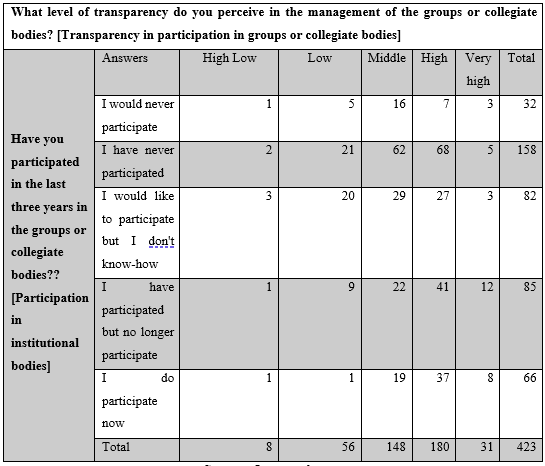
Source: Own production
When analyzing the interviewees who have never participated or would never participate in any group or organization within the university, only 25% perceive that the levels of transparency among the directors of these groups are medium or low because the perception is linked to the living conditions evidencing the relationship between the proposals and the decisions of the institutional bodies that evidence their scope and impact.
Table 7 Participation in institutional bodies - Public management of the national government
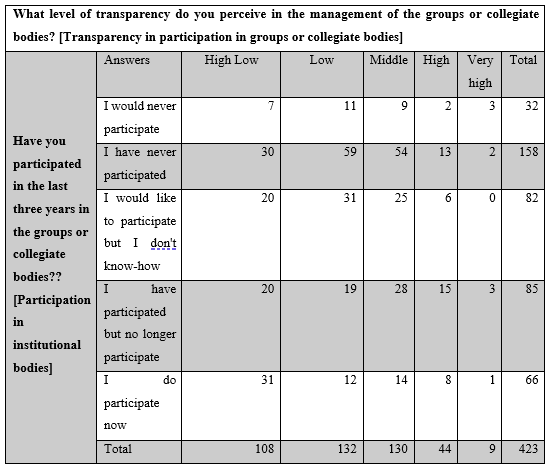
Source: Own production
On the other hand, within this same group of people who have never or would never participate in university groups, 40% of people perceived transparency levels within the national government’s public management to be medio or low. One can assume from this that people view areas relating to politics or the national government in a negative way (percentages varied greatly between different tables).
We have formed 3 indicators with which we aim to combine results from 92 variables and be able to analyze the correlation between these 3 indicators.
Social perception: this measures trust in communication methods, empathy towards different social actors (public servants, religious officials, politicians, etc), and tolerance towards different social environments, beliefs, political affinities, education, etc. Also, the transparency of different groups and organizations.
Therefore, in the surveyed population, it is possible to identify the social perception in medium-low indexes for young people and adults of the ECCI University, indicating the conditions of their environment about the relationship of socioeconomic aspects that affect the low levels of trust.
Social participation: this measures the number of people belonging to different social groups, e.g. within universities, neighborhoods, cities, etc. Promotion of dialogue for resolving conflicts and the knowledge of mediation within civil participation in different social circles. University, syndicates, boards, etc.
Consequently, the ratio of the intervals 0.20 to 1.0 represents a deviation of 0.13 in social participation compared to the mean of 0.54, showing the relationship between mediation and the perception of participation of the population sample with the collegiate bodies in their transparency and management.
Social relevance: measures the importance of personal, family, work, social and civic development. Also, the importance of developing civil empowerment. About the characteristics of the population, they recognize and tolerate the living conditions concerning the perception of the variables related to beliefs, ethnicity, attendance, and political participation of the population sample.
CONCLUSION
Civil empowerment is relevant for the social development of a territory, and in the case of Colombia in recent years this has been demonstrated within secondary and primary education. However, every higher education institution approaches this in its way. The study has shown that although students recognize the importance of tolerance in constructing a better social environment, it is not valued enough to be given the necessary recognition. Trust levels are medium to medium-high, depending on the management, however, trends change depending on possible scenarios that people could be involved in. That is to say, there is a disinterest in contributing to the collective good.
The big challenge for higher education institutions is to approach the task of constructing citizens more decisively and forcefully. The curriculum must strengthen civil empowerment so that students can have a better understanding and appreciation of their role in society. The transformations that Colombia needs must connect to the constant search for synergy between different groups. This will lead to a more cohesive, less fragmented society, which can develop respectfully and inclusively. Such a society has the potential to offer more and better opportunities for strengthening and enhancing shared social capital.
Citizen participation guarantees the consolidation of democracy, therefore, the social capital expressed in trust and associativity allows for increasing the consolidation of the social rule of law in a representative democratic model, in this sense, social capital gains visibility as a relevant factor in the construction of social fabric considering an immaterial resource that economically and socially transforms societies, favoring private interests, without these exceeding the scope of public interest as a component of a developed and cohesive society under principles and values accepted by its members. Thus, as in developing countries, greater management is required from organizations that base their management on transparency and provide real opportunities to exercise political control of citizens, in this scenario social capital can be substantially increased and benefit the community. Community with the benefits it generates.
Finally, it can be seen that there is evidence of a perspective of greater acceptance of the difference between subjects, a favorable trend for the generation of social capital, a reality expressed by the university students assumed as a sample (423), which means that young people can achieve associativity potentially as a transforming factor in the reality of a country like Colombia, where inequality, mistrust or violence have permeated the dynamics of the country in recent years, a reality that does not show a positive outlook for the generation of social capital in the territory, which requires greater articulation between the public and private sectors, increasing the levels of trust links at the horizontal and vertical levels, increasing the generation of formal networks that allow lasting social development over time that contributes to the search for a society more equitable, less unequal where the collective interest prevails over the individual.














